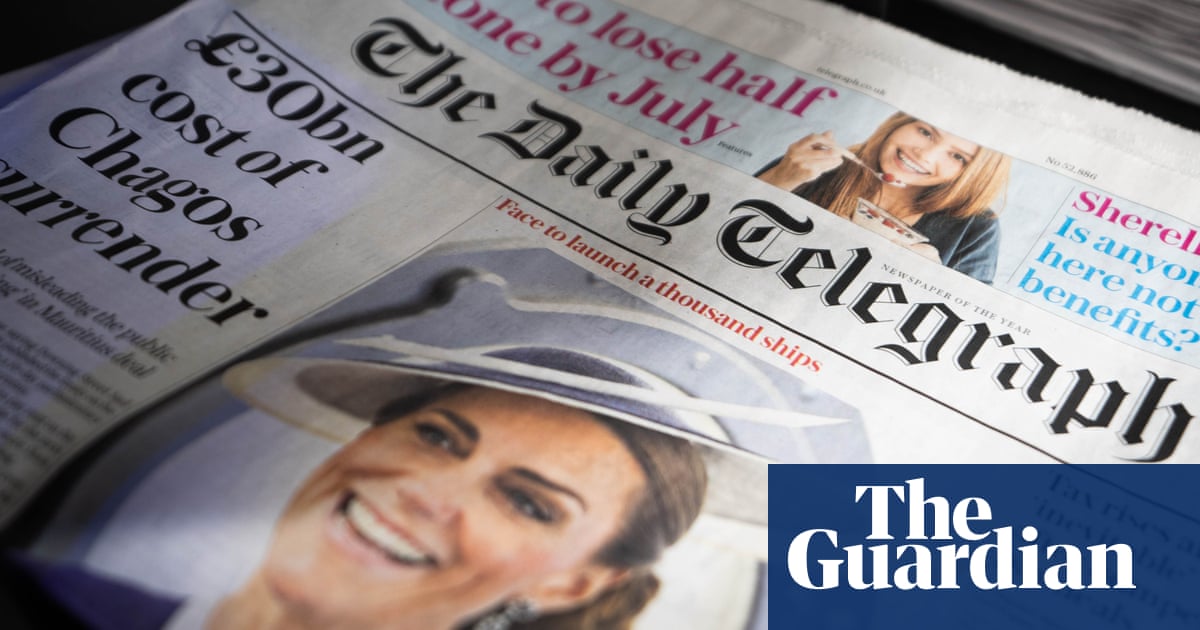A cross-party group of MPs and peers has called on ministers to investigate how a US private equity company is funding its£500m takeover of the Telegraph.
In a letter sent to the culture secretary, Lisa Nandy, last week, the MPs said there was a risk of “potential Chinese state influence” in RedBird Capital.
They said the firm’s chair, John Thornton, sat on the advisory council of China’s sovereign wealth fund and had high-level meetings with Chinese Communist party figures in 2024 and this year.
RedBird Capital announced last month it had agreed a deal to buy the Daily and Sunday Telegraph, endingtwo years of uncertaintyover the future of the titles.
The MPs’ letter said there was “a lack of transparency regarding the source of the funds behind this acquisition” and that it was “conceivable, and increasingly likely, that funds could be sourced directly or indirectly from foreign state actors” including China.
A source close to RedBird said there were no Chinese state funds involved in the deal.
The letter to Nandy was signed by six Conservative MPs including Iain Duncan Smith and Tom Tugendhat, the Labour MPs Alex Sobel and Marie Rimmer, the Liberal Democrats’ Christine Jardine and the Scottish National party’s Chris Law.
The Tory peers Kevin Shinkwin and Catherine Meyer and the crossbenchers Frances D’Souza and David Alton were also among the signatories.
They called on Nandy to “initiate a full and transparent investigation into the acquisition”, consider its national security implications and review Thornton’s “suitability in owning and controlling a UK media outlet”.
It is understood that although the proposed deal will eventually need regulatory approval, no proposal has been submitted to the Department for Culture, Media and Sport (DCMS) for review yet. Only a commercial agreement in principle has been reached.
While RedBird Capital has beenin talks with additional investorsin the US and UK, the deal is fully funded and not contingent on them coming onboard. RedBird Capital will become the sole controlling owner.
The US private equity group is buying the Telegraph titles from RedBird IMI, whichtook control of the newspapers in November 2023after agreeing to pay debts owed by the previous owners the Barclay family.
RedBird Capital contributed a quarter of the funding to RedBird IMI, with the other three-quarters funded by International Media Investments (IMI), a companyowned by Sheikh Mansour bin Zayed Al Nahyan, the owner of Manchester City.
Sign up toBusiness Today
Get set for the working day – we'll point you to all the business news and analysis you need every morning
after newsletter promotion
Sheikh Mansour is vice-president of the United Arab Emirates, and concerns over the consortium’s links to Abu Dhabi prompted acampaign against the takeoverthat culminated in the UK government introducing a law in March last yearblocking foreign statesor associated individuals from owning British newspaper assets. This forced RedBird IMI toput the titles back up for sale.
Under the legislation, which is still going through parliament, ministers said they would allow foreign states to ownstakes of up to 15%in British newspapers.
Subject to the legislation, under RedBird Capital’s acquisition IMI would be reduced to a minority stake in line with the new cap.
The MPs and peers’ letter said allowing the sale to go through would make a mockery of the legislation, adding: “Those who have invested in RedBird should surely be known before any final sale approval can be allowed.”
The DCMS was contacted for comment.
